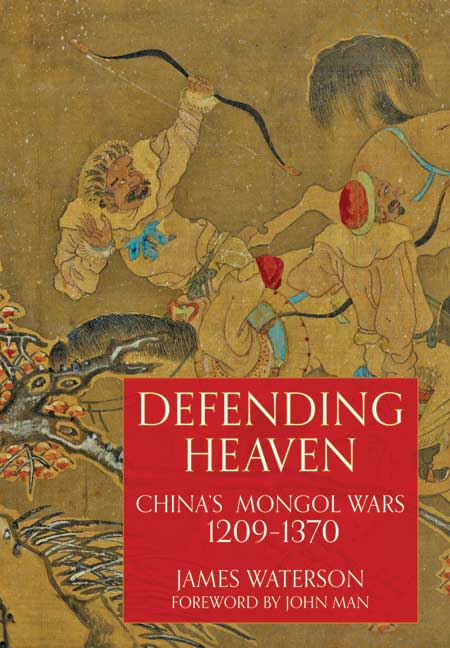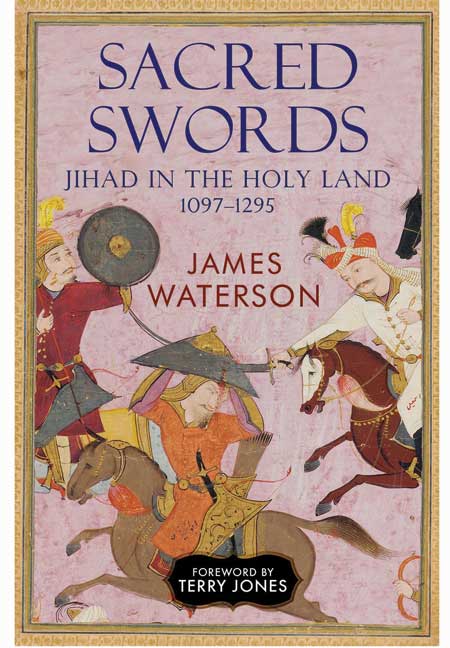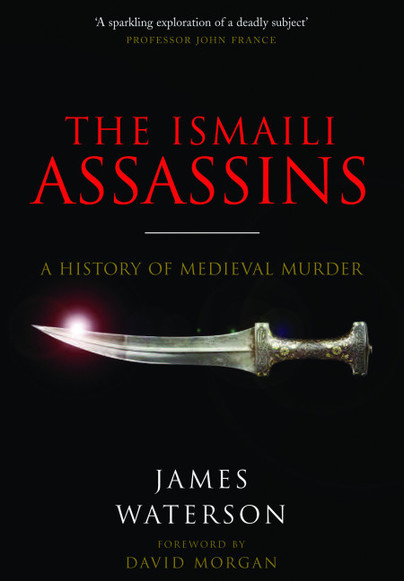Interview with James Waterson
Continuing our Pen and Sword author interview series, here is James Waterson, who introduced me to the Ismaili Assassins. To be clear, in his book, not actually in real life although that would be have been epic.
Tell us a little about yourself
I am a graduate of the School of Oriental and African Studies, University of London. Whilst I am certainly not the classical Englishman abroad I have spent the bulk of my life in either the Middle East, the United States or China. The last few years have called Tuscany home and Dubai ‘the office’, but I’m moving to Prague. In pursuit of a living wage I have acted in Chinese movies, bluffed as a radio host, worked hard as an oil rig worker, taught university, and worked in healthcare at the bedside and as an academic.
I still write and consult on healthcare in disaster management, health economics, medical error reduction and children’s intensive care.
My real bestsellers were about twelve and half million copies of my Oxford University Press textbooks for Chinese children wanting to learn English, unfortunately the ticket price was so low that I am still not even remotely rich. There are also an unpublished but finished novel and an un-finishable detective novel that predate the history books.
I have been writing an historical novel based on the life and deeds of the Crusader, Bohemond of Taranto for about ten years but something else always seems to come up. I would dearly love to write a history of the archers of the East from the Kyudo archers of Japan through the crossbowmen of China, the Turks and Mongols of Central Asia to the Arab and Persian archers of the Middle East, or just write anything as good as Jonathan Sumption’s volumes.
I shoot a Scythian bow currently, sorry, no swords, but my darling has been known to threaten me with her katana, and has promised to buy me a Kyodo bow for my birthday…
What made you focus on the period of history you have written about?
I went to university with the intention to study Chinese history. History 101 was a required starter course with a whistle-stop tour through South Asian, East Asian, African and Near East History and I immediately switched to studying the Near East upon discovering that it truly is the crossroads of the world and the peoples, warriors, and militant sects that populated it from Qipchaq Turks to Slavs, Daylamites, Qarmatians, Ghazis and Assassins make for a rich and vibrant canvas.
I also feel like the Middle East, is for many Europeans poorly understood, despite it being right next door to us. I am not sure that I am capable of making it less alien, but that is not a reason not to try.
I am reminded of the character Nabby Adams in Anthony Burgess’ ‘Time for a Tiger’, who states ‘Malaysia’s not the East mate, Palestine’s the East…’ I have since written about China and the Balkans, and to be frank, the similarities in polities, beliefs and historical determinants are rather more striking than they may first seem.
Where do you do most of your writing?
I have a beautiful desk that I bought in Shanghai, it’s now in Tuscany and it is on its way to Prague at some point… and I think I’ve written about 30 lines, in total, of my five books on it. So, most of them have been written in hotels, in hotel lobbies, in airport lounges, in bars, and in friends’ homes.
I spend my time shuttling between Asia and Europe and my first book ‘The Knights of Islam’ was written on a dying laptop on an ironing board in Shanghai in an apartment that I was being evicted from. My forthcoming book on the Crusades has mostly been written in Geneva, Prague, Riyadh and Dubai and the Covid lockdown has really helped with its progress…
Share one strange fact you found while researching your work?
The fact that upon hearing reports the massacre of the army of Conrad in Anatolia during the Second Crusade aristocratic and knightly families in Germany by Saljuq Turks in Anatolia in many German aristocratic families altered their family histories and forged genealogical trees to include Turks in their lineage, such was their regard for the martial prowess of the enemy.
What is your favourite resource for carrying out research?
Jstor is an incredibly useful resource for writers of history, particularly for some of the more minority interest (I should be careful with that statement) literary journals that relate to the culture or ‘lore’ of nebulous concepts such as chivalry or its ‘equivalent’ in Middle Eastern culture the Furusiyya.
One of the most interesting things about such concepts and the military societies that gave birth to them is how poetry, art and ‘lore’ constantly fed back into the ideals and the culture of knighthood, Mamlukdom, militant groups like the Assassins and perhaps even all those who step onto the battlefield, strengthening and sustaining the ‘lore’. Pace Cocteau, ‘ over time history becomes myth, and myth becomes history’.
What are you working on next?
I am a health economist by trade so I should be working on that… but I am actually working on a book taking the ‘crusades period’, which for me starts somewhere around Charles Martel and ends with the French reoccupying Lebanon after WWII, and telling its story, with multiple asides, through the material objects that were either a direct creation of conflicts or intrinsic to it. These can range from a hand grenade of the Mamluk period, through to a customs post or a piece of candy.
Where can people find about more about your work? Are you active on social media, publish your own website for example?
I am not a great one for social media I am afraid… Umberto Eco’s dire warnings about its dangers have perhaps infected me too much. But my author page on amazon is fairly well up to date.
Books
Defending Heaven
This absorbing new history explores the epic struggle between the most powerful empires of the medieval world: the Mongols and the mighty Chinese Jin, Song and Ming dynasties.
The resistance of the Chinese dynasties to the Khans is a complex and rich saga of shifting alliances and political scheming, vast armies and navies, bloody battles and an astonishing technological revolution. Defending Heaven brings together, for the first time in one volume, a complete history of China’s Mongol Wars in all their ferocious and fascinating detail. Setting the conflict in the wider context of China’s ancient and almost perpetual conflict with the northern nomads, it sheds intriguing new light on the evolution of China’s military society and the management, command and control of the army by the Chinese state.
Combining powerful and accessible narrative with illuminating judgements, this book complements James Waterson’s earlier works which cover the Islamic world’s conflict with the Mongol superpower. It places the war in China within a truly international setting and demonstrates the vital importance of the long confrontation between the Khans and Emperors for medieval and early modern Eurasian history.
Sacred Swords
In 1071 Muslim Turks crushed the Byzantine Emperor s Anatolian army at Manzikert. The Crusades, the West s response to this catastrophe, are well known as are the names of the European nobles who fought in them. The names and deeds of many of the Crusaders opponents in the Holy Land are often unfamiliar to Western readers.
Using primarily Muslim sources, Sacred Swords reconstructs the politics of the Levant on the eve of the First Crusade and places it in the wider context of the Muslim world of the period. This was a realm where war with the Crusaders was only one part of the military and political endeavours of a Muslim prince of the Levant. Much of the action is comprehensible only when the outlook and position of the Princes is understood.
Waterson tells the story of the famed leaders of the jihad the lives and deeds of Zangi, Nur al-Din, Saladin and Baybars are all recounted. Sacred Swords also illustrates the evolution of the jihad in which these Princes were engaged. The story of the Holy War that would eventually destroy the Latin Kingdom is traced and analysed from its origins among the Princes of northern Iraq, as is the long naval contest that raged between the navy of Egypt and the Crusader fleets.
The Ismaili Assassins
The Ismaili Assassins were an underground group of political killers who were ready to kill Christians and Muslims alike with complete disregard for their own lives. These devoted murderers were under the powerful control of an enigmatic grand master who used assassination as part of a vast strategic vision that embraced Egypt, the Levant and Persia – even the court of the Mongol Khans in faraway Qaraqorum was not beyond the reach of his shadowy followers and their blades.
The Assassins often slayed their victims in public, cultivating their terrifying reputation. They assumed disguises and their weapon of choice was a dagger. The dagger was blessed by the grand master and killing with it was a holy and sanctified act; poison or other methods of murder were forbidden to the followers of the sect. Surviving a mission was considered a deep dishonour and mothers rejoiced when they heard that their Assassin sons had died having completed their deadly acts.
Unsurprisingly, their formidable reputation spread far and wide. In 1253, the Mongol chiefs were so fearful of them that they massacred and enslaved the Assassins’ women and children in an attempt to liquidate the sect. The English monarch, Edward I, was nearly dispatched by their blades and Richard the Lionheart’s reputation was sullied by his association with the Assassins’ murder of Conrad of Montferrat.
The Ismaili Assassins explores the origins, actions and legacy of this notorious sect. Enriched with eyewitness accounts from Islamic and Western sources, this important book unlocks the history of the Crusades and the early Islamic period, giving the reader entry into a historical epoch that is thrilling and pertinent.
< BACK

